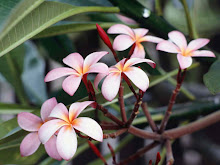What images come to mind when you think about filters? Your morning cup of java juice? The air-conditioner that died this summer because you forgot to change the filter? Or, more like you never cleaned the other filter that you never knew existed because it was under the house buried in mud because your neighbor's run-off runs under your house. That's more like it! NOT!!!
Filters are our lenses through which we view the world. Some call them our sunglasses. They protect us from the things we don't want to see. Funny thing is that most of us aren't even aware of them. It's like the 900lb gorilla sitting on your back that keeps you from getting up to do what's really important. You feel him, but you don't see him, so he can't be there.
One of my first impressions of Little Rock was how little things were...the airport, the freeway, the buildings. I looked long and hard for a skyscraper, a mountain, snow. It was autumn and everything was dead, brown and shriveled up.
Then I realized there was a polarization thing going on. I thought back to watching Archie Bunker, Chico and the Man, and Good Times. I wondered...was that for real? No way, right? That was TV drama. They blow stuff up larger than life so people laugh harder. Or do they?
When you live in the islands, you see a lot of different faces. You label people and they label you. You laugh, joke, tease, but you don't kill them for looking different. On June 19, 1982, Vincent Chin was beaten with a baseball bat outside a McDonald's in Detroit by Ronald Ebens and Michael Nitz, two laid off auto workers. Ebens and Nitz blamed competition from Japan for their problems.
The real problem was that Vincent Chin was American. And, he was Chinese, not Japanese. I remember seeing the news reports and being afraid. Sure, it was on the Mainland, thousands of miles away from Hawai'i, but hate crimes have a chilling effect of the soul. If you are Japanese, you remember the internment camps of WWII and learn about reparation. If you grow up in Hawai'i, you learn how social injustice is woven into the fabric of American history. You learn about the overthrow of the Hawaiian monarchy, the Civil Rights movement, and hopefully, about Vincent Chin.
His case became a lesson in social justice even though justice was never served and Vincent died from his injuries on June 23, 1982. Asians are often overlooked here in Arkansas because so much attention is focused on African-Americans and Hispanics. The fact that Asians are such a diverse group hailing from countries such as China, Japan, Korea, Turkey, India, Thailand, and the Philippines to just name a few, is more reason for us to make our voices heard. Unlike Hawai'i where mixed raced children are common. Here they can be treated as seconds (a retail term for defective merchandise.)
So what can we do to unclog that filter? How can we change the way we view the world? And is it even possible to influence the way the world sees us?
Filters are our lenses through which we view the world. Some call them our sunglasses. They protect us from the things we don't want to see. Funny thing is that most of us aren't even aware of them. It's like the 900lb gorilla sitting on your back that keeps you from getting up to do what's really important. You feel him, but you don't see him, so he can't be there.
One of my first impressions of Little Rock was how little things were...the airport, the freeway, the buildings. I looked long and hard for a skyscraper, a mountain, snow. It was autumn and everything was dead, brown and shriveled up.
Then I realized there was a polarization thing going on. I thought back to watching Archie Bunker, Chico and the Man, and Good Times. I wondered...was that for real? No way, right? That was TV drama. They blow stuff up larger than life so people laugh harder. Or do they?
When you live in the islands, you see a lot of different faces. You label people and they label you. You laugh, joke, tease, but you don't kill them for looking different. On June 19, 1982, Vincent Chin was beaten with a baseball bat outside a McDonald's in Detroit by Ronald Ebens and Michael Nitz, two laid off auto workers. Ebens and Nitz blamed competition from Japan for their problems.
The real problem was that Vincent Chin was American. And, he was Chinese, not Japanese. I remember seeing the news reports and being afraid. Sure, it was on the Mainland, thousands of miles away from Hawai'i, but hate crimes have a chilling effect of the soul. If you are Japanese, you remember the internment camps of WWII and learn about reparation. If you grow up in Hawai'i, you learn how social injustice is woven into the fabric of American history. You learn about the overthrow of the Hawaiian monarchy, the Civil Rights movement, and hopefully, about Vincent Chin.
His case became a lesson in social justice even though justice was never served and Vincent died from his injuries on June 23, 1982. Asians are often overlooked here in Arkansas because so much attention is focused on African-Americans and Hispanics. The fact that Asians are such a diverse group hailing from countries such as China, Japan, Korea, Turkey, India, Thailand, and the Philippines to just name a few, is more reason for us to make our voices heard. Unlike Hawai'i where mixed raced children are common. Here they can be treated as seconds (a retail term for defective merchandise.)
So what can we do to unclog that filter? How can we change the way we view the world? And is it even possible to influence the way the world sees us?

No comments:
Post a Comment